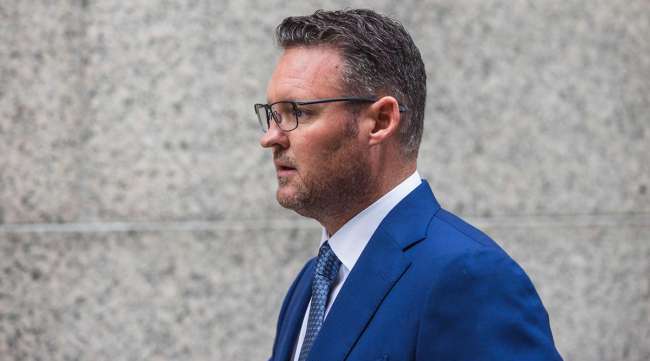Bloomberg News
Nikola Founder Trevor Milton Guilty of Defrauding Investors

[Stay on top of transportation news: Get TTNews in your inbox.]
Nikola Corp. founder Trevor Milton was convicted of fraud Oct. 14 for misleading investors in the electric truck company.
Milton, 40, was found guilty of one count of securities fraud and two counts of wire fraud by a federal jury in Manhattan, in a boost to the Justice Department’s efforts to crack down on corporate crime.
He was acquitted of a more serious securities fraud charge but still faces as many as 20 years in prison.
He briefly shook his head as the verdict was read out, raised his left hand to his face and looked back at the nearly two dozen family members and friends gathered in the benches behind him.
“I think the evidence was clear,” Juror No. 5, a woman with gray hair and glasses, said afterward. She declined to give her name.
Milton is due to be sentenced on Jan. 27.
“I did nothing wrong,” Milton said outside the courthouse. “I was talking about the business plan.”
Asked about his plans, he said, “Got to keep fighting. That’s all you can do, especially when you didn’t do anything.”
Nikola said it’s “pleased to close this chapter” about statements Milton made years ago and added that “neither the prosecutors nor Mr. Milton questioned the company’s promising future and unique ability to positively transform the commercial transportation industry.”
#BREAKING: Trevor Milton, founder of hydrogen vehicle co $NKLA has just been found guilty on 3 of 4 counts (1 of 2 securities fraud charges). Inner City Press has covered and will publish a booklet about the trial, tweeted verdict here https://t.co/KBC7CcQxgI
— Inner City Press (@innercitypress) October 14, 2022
It’s been a wild ride for the charismatic entrepreneur, whose fortune has shrunk by hundreds of millions of dollars after having once reached the billions shortly after the company listed its shares in June 2020. Milton, who remains the company’s biggest individual shareholder, founded Nikola in 2014 and built it into a company valued at $34 billion when it went public, more than Ford Motor Co. at one point.
Prosecutors argued that Milton enticed retail investors to buy Nikola shares by making false statements about the company’s products and capabilities in numerous tweets, media interviews and podcasts, sharply exaggerating Nikola’s capacity to manufacture trucks powered by hydrogen fuel cells as well as its ability to produce the fuel itself.
It was “lie after lie after lie,” Assistant U.S. Attorney Jordan Estes told the jury in her closing argument on Oct. 13. “His lies may have been on social media, but make no mistake: This was an old-fashioned fraud.”
Milton’s lawyers called the case a “prosecution by distortion,” contending that their client never meant to deceive potential investors and that, in any case, his statements weren’t material, or important enough to influence those investors’ decisions.
Milton was generally upbeat as he arrived at court in a suit and tie to sit with his lawyers. In his own closing, which brought Milton’s wife to tears, defense attorney Marc Mukasey asked the jurors to “imagine the nightmare it is for Trevor, at 40 years old, to have his life hang in the balance” because of an overzealous prosecution.
Damian Williams, U.S. attorney for Manhattan, said the case is a “warning to anyone who plays fast and loose with the truth to get investors to part with their money.”
During the trial, which kicked off with opening statements on Sept. 13, the government called a dozen witnesses. It started with Paul Lackey, a former Nikola contractor whose allegations of fraud helped spur the criminal probe.
PHOTO GALLERY: Nikola trucks
Lackey, an engineer at the electric-drive systems company EVDrive, said he gave Nate Anderson’s Hindenburg Research information in exchange for a share of its profits from shorting the company. The short-seller’s September 2020 report called Nikola an “intricate fraud” that, among other allegations, overstated the capabilities of its earliest test trucks. Nikola shares tumbled.
The government called other Nikola insiders to the witness stand. Among them:
- Brendan Babiarz, a former designer for Nikola who said a prototype of the electric vehicle startup’s planned Badger pickup truck was made partly of components from a Ford F-150 Raptor
- Chief Executive Officer Mark Russell, who said he learned only after joining the company that its debut electric truck had neither a natural-gas-powered turbine nor a fuel cell when Milton unveiled it
- Chief Financial Officer Kim Brady, who said Milton was so “hyper-focused” on the company’s stock price that when the shares fell $5 on their first day of trading, he thought something was wrong with the Nasdaq
The defense called Harvard Law School professor Allen Ferrell, an expert on economics and the stock market, who told the jury that traders mostly shrugged off statements Milton made between the time his company went public and the time he resigned.
— With assistance from Bob Van Voris.
Want more news? Listen to today's daily briefing below or go here for more info:




